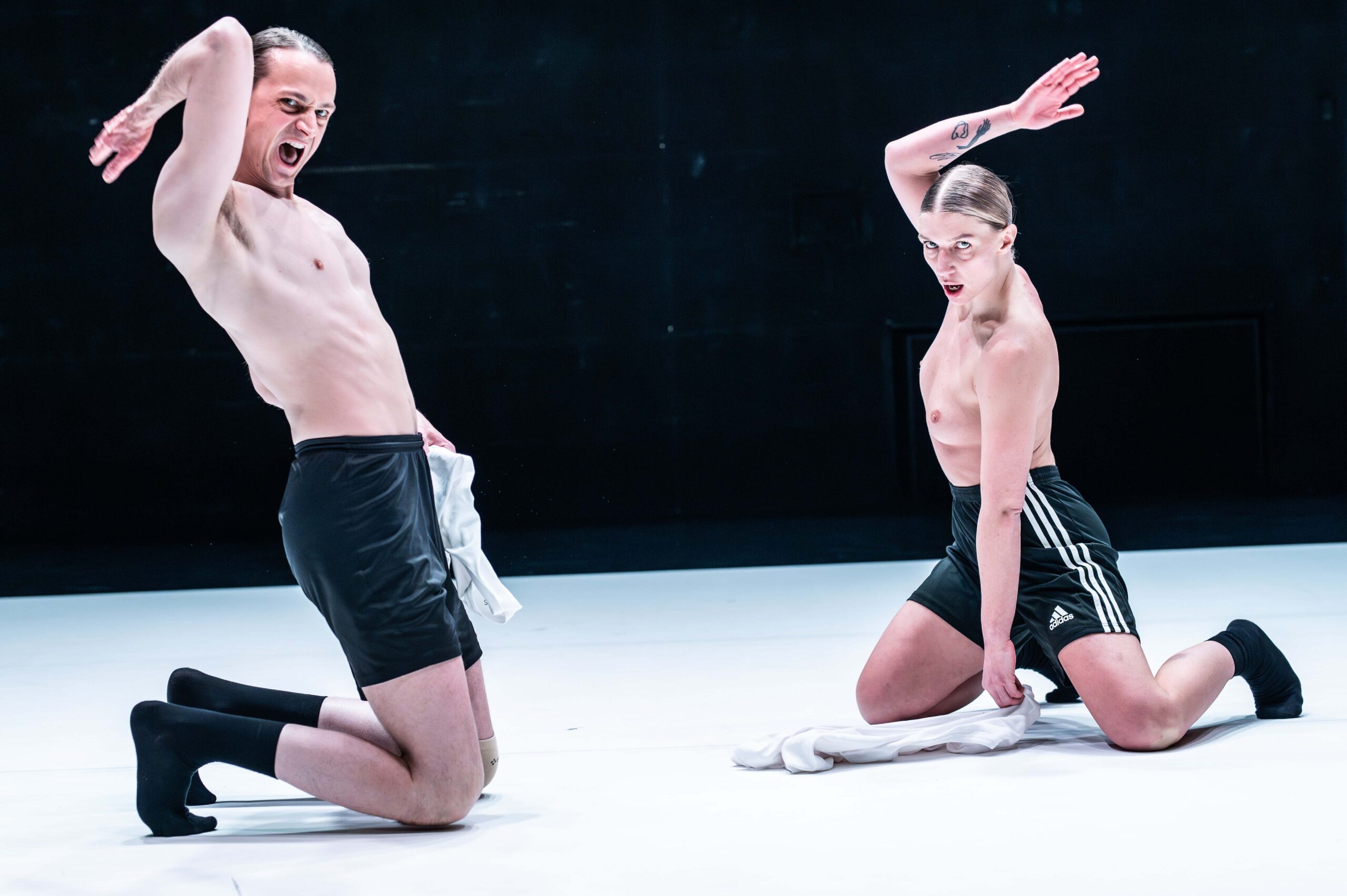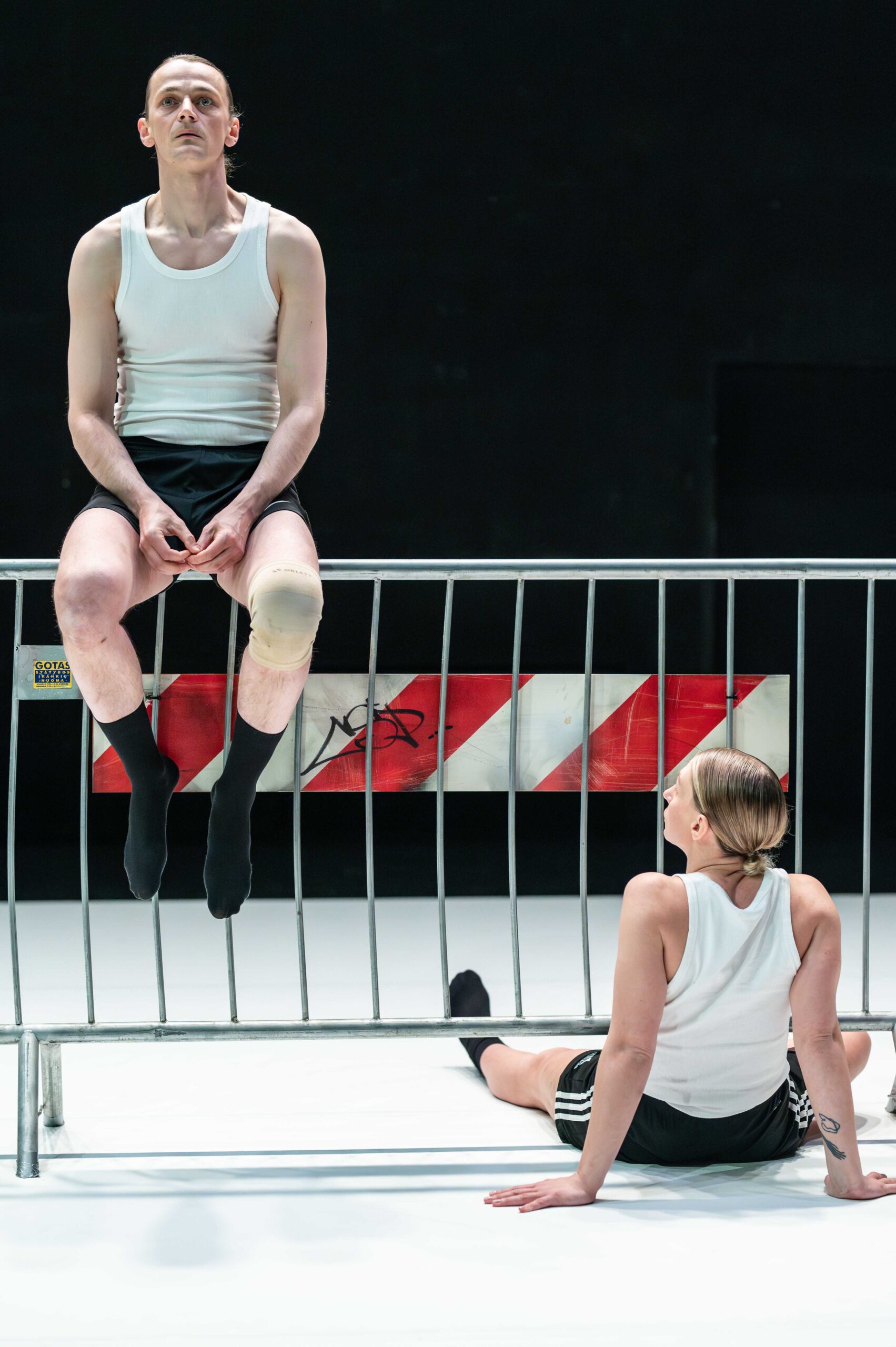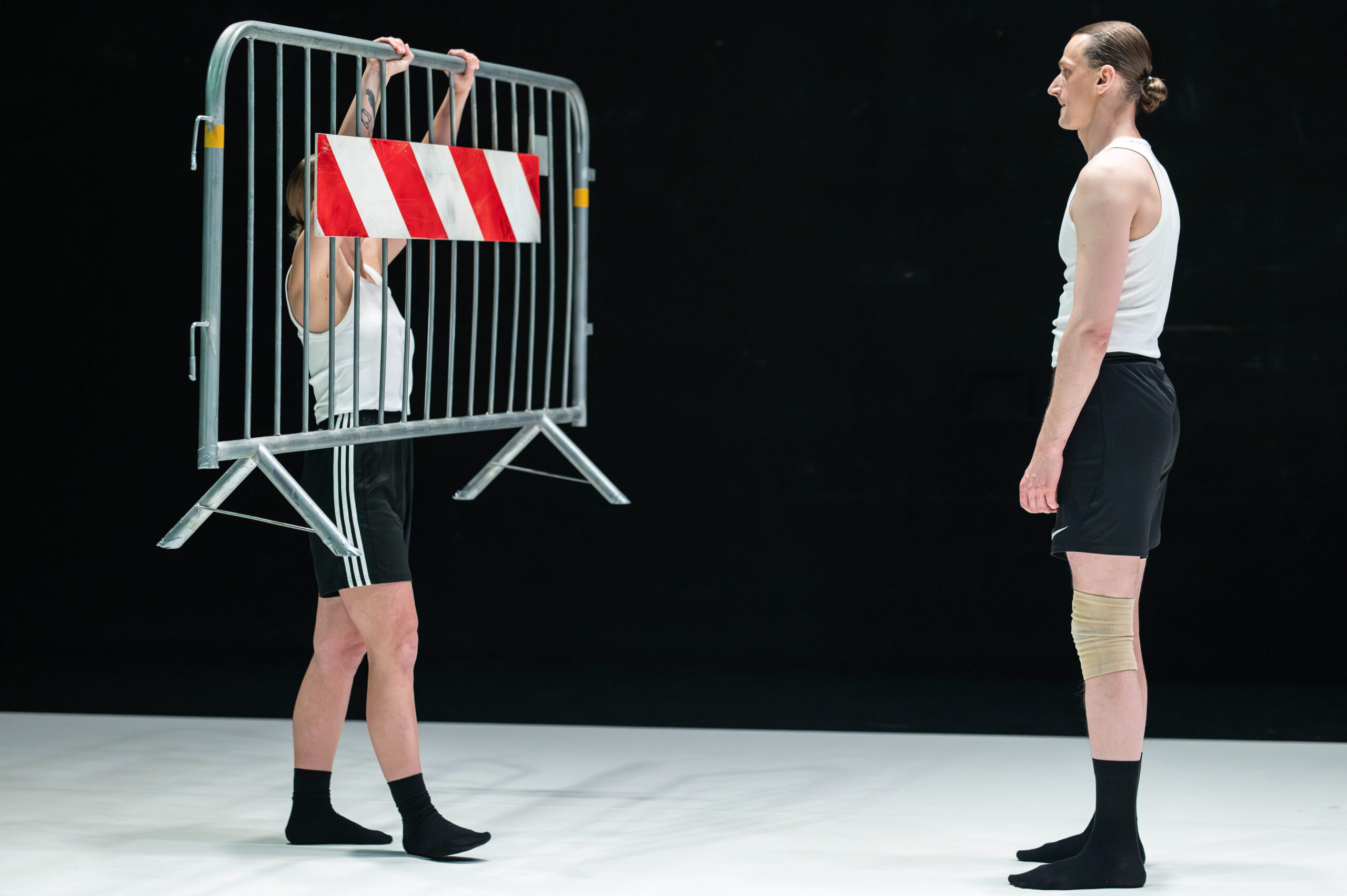Dancing on the fault line: blame and fear in Lithuanian-Belarusian dance collaboration Clap&Slap
Dancing on the fault line: blame and fear in Lithuanian-Belarusian dance collaboration Clap&Slap
Interview | 10.10.2025
First comes the clapping: a cheerful gesture of recognition, which the audience soon realises is the rhythm for the performers to slap each other. Or themselves. Clap&Slap, the performance by Lithuanian contemporary dance star Agnietė Lisičkinaitė and Belarusian performer Igor Shugaleev, wastes no time in taking us to see the irreparable division sawn by the war, the futility of blame and performativeness of self-punishment, as well as the dark corners of one’s soul opened by fear.
First comes the clapping: a cheerful gesture of recognition, which the audience soon realises is the rhythm for the performers to slap each other. Or themselves. Clap&Slap, the performance by Lithuanian contemporary dance star Agnietė Lisičkinaitė and Belarusian performer Igor Shugaleev, wastes no time in taking us to see the irreparable division sawn by the war, the futility of blame and performativeness of self-punishment, as well as the dark corners of one’s soul opened by fear.
SHARE:
Premiered in May 2025 at the New Baltic Dance Festival in Vilnius, marks a rare occasion of Lithuanian-Belarusian collaboration at times when the idea itself might feel fraught. After Russia’s full-scale invasion of Ukraine, which used Belarus as its springboard, the public support for Belarus in Lithuania now comes along with the question of whether someone is a “good” Belarusian.
Two performers from opposite sides of the debate, working together in the performance, is precisely what makes the work matter. It is not one nation imagining the other for its own audience, but an attempt to speak together.
Angiete Lisičkinaitė admits in the interview with the Chrysalis Mag that making it felt like going against the current.
"The day before I left for the first residency in Berlin, one critic asked me: 'Are you sure Igor is a good Belarusian?' It was a real question,” Lisičkinaitė says, adding that the process was not just theoretically or philosophically uncomfortable — she was uncertain if the piece would ever get funding. The dilemma was no longer just the subject or artistic exploration; it became the process of its creation.
“That is so brave of her (Lisičkinaitė) to work on that piece together with a Belarusian,” I’ve heard from an audience member, a remark underscoring that the piece in itself is a rare endeavor.
Premiered in May 2025 at the New Baltic Dance Festival in Vilnius, marks a rare occasion of Lithuanian-Belarusian collaboration at times when the idea itself might feel fraught. After Russia’s full-scale invasion of Ukraine, which used Belarus as its springboard, the public support for Belarus in Lithuania now comes along with the question of whether someone is a “good” Belarusian.
Two performers from opposite sides of the debate, working together in the performance, is precisely what makes the work matter. It is not one nation imagining the other for its own audience, but an attempt to speak together.
Angiete Lisičkinaitė admits in the interview with the Chrysalis Mag that making it felt like going against the current.
"The day before I left for the first residency in Berlin, one critic asked me: 'Are you sure Igor is a good Belarusian?' It was a real question,” Lisičkinaitė says, adding that the process was not just theoretically or philosophically uncomfortable — she was uncertain if the piece would ever get funding. The dilemma was no longer just the subject or artistic exploration; it became the process of its creation.
“That is so brave of her (Lisičkinaitė) to work on that piece together with a Belarusian,” I’ve heard from an audience member, a remark underscoring that the piece in itself is a rare endeavor.

Clap & SLAP / Photo by D.Alisauskas / 2025.
On stage, the tensions are immediately introduced through a performer duo pressing into each other the metal barrier used to separate crowds at a concert or, rather, a protest. In about an hour, the mundane dialogue will transform into a barrage of accusations, and the barrier, rotated slightly, will turn into a barricade, a cell door, and a border fence.
Guilt and blame enter as a duel. Lisičkinaitė presses Shugaleev: how can he not feel responsible for his country’s participation in the war? Shouldn’t he have stayed to fight Lukashenko? Exiled Shugaleev admits his share of personal responsibility yet refuses to carry responsibility for the crimes of the regime he opposed.
“I noticed that I’m not arguing why I'm not responsible, but my argument becomes blaming (in return),” Igor Shugaleev told Chrysalis Mag, noting that the avenue of blaming only leads to reciprocal aggression, not genuine dialogue. "I’m not speaking about me, why I'm not responsible, I’m speaking about her, as in ‘you are a b*tch for asking about it.”
Lacking resolution, the argument resorts to the physicality of Igor and Agnietė slapping themselves in a move reminiscent of the church’s self-flagellation. The claps, introduced just a moment ago in a video cut featuring the performance’s playwright, Bush Hartshorn, who taught the audience to clap together, as if we were just a bunch of five-year-olds on a school trip, turn violent, leaving painfully reddish marks on the performers’ backs — a punishment for the alleged wrongdoing or saying.

Clap & SLAP / Photo by D.Alisauskas / 2025.
The performative penance escalates into farce when the soundtrack cuts to Daddy Yankee’s “Gasolina,” turning self-punishment into unsettling grotesque.
"We wanted to put some cringe in it because it is cringy that we are punishing ourselves so much on the stage,” Lisičkinaitė says, underscoring how someone’s suffering can become someone else’s show in real life.
The cringe grows into apparent tension as in the scene ahead, the performers would make the audience clap to create the rhythm for them to slap each other. The universal gesture of support and admiration becomes the rhythm for more pain inflicted on each other.
In this acute gesture, the public becomes complicit. With sharp political commentary, the piece underscores how public guilt fails to resolve the conflict but rather becomes a spectacle.
In the interview, both artists return to the matter of finding the right way to deal with responsibility.
"I had doubts every time I was asked this question. Maybe she’s right, I thought, maybe we as a society are responsible,” Shugaleev notes. "But if we were responsible, what price would we have to pay?” Shugaleev says.
Friends from Minsk who accidentally ended up at the performance stopped short of walking out within minutes, over concerns of repercussions at home for being seen at such a politically charged event, but stayed, thinking that a "Belarusian storming out of the dance performance about war" would make quite a headline. After all, while expecting Belarusians to fight not many of the audience at Menų spaustuvė that day could tell how many lives with of political prisoners this struggle had already taken.

Clap & SLAP / Photo by D.Alisauskas / 2025.
Lisičkinaitė says that it’s easy to become inhuman by pushing it too far, especially speaking from the privileged position of a citizen of a democratic country.
For the Lithuanian audience, the performance reads as almost obvious, Lisičkinaitė heard. But as the duo was developing the concept in residencies in Western Europe, the concept of Lithuanians and Belarusians going apart over the war between two unrelated nations sounded foreign, even outlandish.
This reality adds a layer to the performance, making Bush Hartshorn’s earlier clapping lesson sound like a Western attempt to bring the two sides still experiencing the conflict to a superficial reconciliation. Although, this probably wasn’t an intended reference.
In dealing with blame, the performance unearths the darker aspect of public shaming. The righteousness exhibited in the line of questioning yields to fear, revealing that the nature of the question is not judgmental, but rather a wish for reassurance and a desire to be safe.
As the ghost of possible war looms over Europe, it’s almost tangible in Lithuania.
"If something happens,” Lisičkinaitė says in the interview. “I'm quite sure that three of my neighbors will take the first plane to London. So it’s pushing others to prove that we are not f*cked, that if Igor took the responsibility, maybe my neighbor will take the responsibility.”
Clap&Slap resists liberal desire for reconciliation. Instead of sliding into toothless pacifism, it resolves into performers separating, each into their corner of the stage, and singing the words of the anthems — the official in case of Lithuania and a symbol of 2020 protests for Bealrus.
The physical distance mirrors the political one. As the lights dim, the performance does not offer answers. Instead, it gives a sober and honest look at the fracture that remains between nations with dialogue possible only between individuals.

Igor Shugaleev is Belarusian actor and movement artist. Born on April 5, 1986, in Gomel, Belarus.
In 2012, he graduated from the Acting Department of the State Academy of Theatre Arts in Minsk.
He is a theater and film actor, performer, dancer, and choreographer. Since 2021, he has been living and working in Poland.
As an actor and dancer, he has collaborated with numerous Belarusian theaters.
Since 2019, in collaboration with artists from various creative disciplines, he has been creating interdisciplinary solo projects at the intersection of theater, dance, and performance. The central theme of his artistic practice is the physically exhausted body, symbolizing those oppressed by various systems.
Igor Shugaleev has gained international recognition for his politically engaged work, which explores protest culture, the impact of political regimes, and personal interpretations of freedom.
His works 375 0908 2334, The Body You Are Calling Is Currently Not Available and Ich heiße Frau Troffea (co-created with Sergey Shabohin) have been presented at major European contemporary art festivals, including.
In 2021 and 2024, these works were also featured in the Generation Aftershowcase at Nowy Teatr and have been part of Nowy Teatr’s repertoire since 2021.
From 2025, actor at the Nowy Teatr in Warsaw.
Igor Shugaleev is Belarusian actor and movement artist. Born on April 5, 1986, in Gomel, Belarus.
In 2012, he graduated from the Acting Department of the State Academy of Theatre Arts in Minsk.
He is a theater and film actor, performer, dancer, and choreographer. Since 2021, he has been living and working in Poland.
As an actor and dancer, he has collaborated with numerous Belarusian theaters.
Since 2019, in collaboration with artists from various creative disciplines, he has been creating interdisciplinary solo projects at the intersection of theater, dance, and performance. The central theme of his artistic practice is the physically exhausted body, symbolizing those oppressed by various systems.
Igor Shugaleev has gained international recognition for his politically engaged work, which explores protest culture, the impact of political regimes, and personal interpretations of freedom.
His works 375 0908 2334, The Body You Are Calling Is Currently Not Available and Ich heiße Frau Troffea (co-created with Sergey Shabohin) have been presented at major European contemporary art festivals, including.
In 2021 and 2024, these works were also featured in the Generation Aftershowcase at Nowy Teatr and have been part of Nowy Teatr’s repertoire since 2021.
From 2025, actor at the Nowy Teatr in Warsaw.

Agnietė Lisičkinaitė is a Lithuanian choreographer and dancer. In 2014, she completed her bachelor's degree in contemporary dance at the Lithuanian Academy of Music and Theater, and in 2015, she completed her master's degree in choreography. Since 2016, Agnietė has been a member of the Contemporary Dance Association (Lithuania).
She made her debut as a choreographer in 2014. Since then, she has been working in Lithuania not only as a performer, but also as a dancer at the AIROS Dance Theater, the Vilnius City Dance Theater LOW AIR, and the National Opera and Ballet Theater in the opera Idomeneo.
Since the beginning of her creative career, Agnietė has presented four performances: Popular Problems (2014), B and B Dialogue (2016), Z+ (2017), and Banana Dream (2018).
She also registered the public organization Be kompanijos, which is engaged in artistic and educational activities. The artist combines her professional activities with the creation of dance performances and teaching.
Text by Maria Yeryoma.
Перадрук матэрыялу або фрагментаў матэрыялу магчымы толькі з пісьмовага дазволу рэдакцыі.
Калі вы заўважылі памылку ці жадаеце прапанаваць дадатак да апублікаваных матэрыялаў, просім паведаміць нам.
Agnietė Lisičkinaitė is a Lithuanian choreographer and dancer. In 2014, she completed her bachelor's degree in contemporary dance at the Lithuanian Academy of Music and Theater, and in 2015, she completed her master's degree in choreography. Since 2016, Agnietė has been a member of the Contemporary Dance Association (Lithuania).
She made her debut as a choreographer in 2014. Since then, she has been working in Lithuania not only as a performer, but also as a dancer at the AIROS Dance Theater, the Vilnius City Dance Theater LOW AIR, and the National Opera and Ballet Theater in the opera Idomeneo.
Since the beginning of her creative career, Agnietė has presented four performances: Popular Problems (2014), B and B Dialogue (2016), Z+ (2017), and Banana Dream (2018).
She also registered the public organization Be kompanijos, which is engaged in artistic and educational activities. The artist combines her professional activities with the creation of dance performances and teaching.
Text by Maria Yeryoma.
Перадрук матэрыялу або фрагментаў матэрыялу магчымы толькі з пісьмовага дазволу рэдакцыі.
Калі вы заўважылі памылку ці жадаеце прапанаваць дадатак да апублікаваных матэрыялаў, просім паведаміць нам.
SHARE:
Also read:

FOLLOW US
INSTAGRAM TELEGRAM TIKTOK FACEBOOK YOUTUBE
© Chrysalis Mag, 2018-2025
Reprinting of materials or fragments of materials
is allowed only with the written permission


